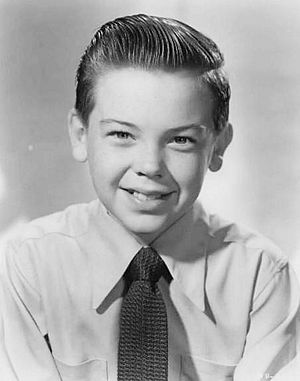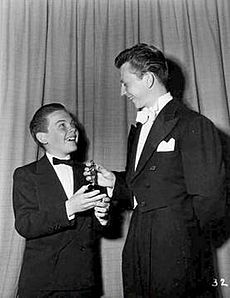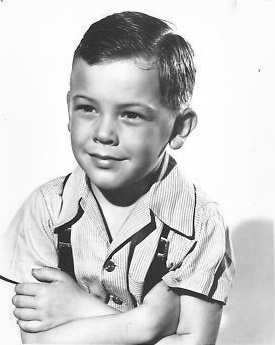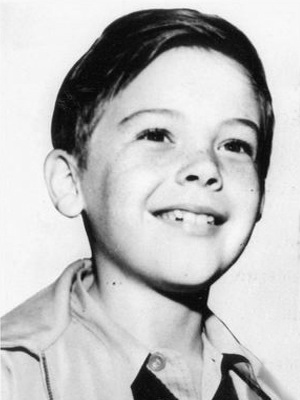Bobby Driscoll facts for kids
Quick facts for kids
Bobby Driscoll
|
|
|---|---|

Driscoll in 1950
|
|
| Born |
Robert Cletus Driscoll
March 3, 1937 Cedar Rapids, Iowa, U.S.
|
| Died | c. March 30, 1968 (aged 31) East Village, Manhattan, New York, U.S.
|
| Resting place | Hart Island's potter's field, New York, U.S. |
| Occupation | Actor |
| Years active | 1943–1965 |
|
Notable work
|
Song of the South (1946) So Dear to My Heart (1949) Treasure Island (1950) Peter Pan (1953) |
| Spouse(s) |
Marilyn Jean Rush
(m. 1956; div. 1960) |
| Children | 3 |
| Awards | Academy Juvenile Award 1950 So Dear to My Heart; The Window Milky Way Gold Star Award 1954 for his TV and Radio work Hollywood Walk Of Fame 1560 Vine Street |
Robert Cletus Driscoll (born March 3, 1937 – died around March 30, 1968), known as Bobby Driscoll, was an American actor. He starred in movies and TV shows from 1943 to 1960. He was famous for his roles in many Walt Disney Studios films. These included Song of the South (1946), So Dear to My Heart (1949), and Treasure Island (1950). He also starred in RKO's The Window (1949).
Bobby Driscoll was also the model and voice for the main character in Disney's animated movie Peter Pan (1953). He won a special Academy Juvenile Award for his amazing performances in So Dear to My Heart and The Window. In the mid-1950s, his acting career slowed down. He then focused on guest roles in TV shows and later became interested in modern art. His body was found on March 30, 1968, in an empty building in New York City.
Contents
Early Life and First Steps in Acting
Bobby Driscoll was born Robert Cletus Driscoll in Cedar Rapids, Iowa. He was the only child of Cletus and Isabelle Driscoll. His father sold insulation, and his mother was a former schoolteacher. When Bobby was young, his family moved to Des Moines. In 1943, they moved to Los Angeles because his father needed to live in a warmer climate for his health.
Bobby's parents were encouraged to help him become a child actor. Their barber's son, who was an actor, helped Bobby get an audition at MGM for a movie called Lost Angel (1943). Bobby was only five years old. During a tour of the studio, Bobby saw a fake ship and asked where the water was. The director was impressed by his curiosity and chose him for the role.
Career Highlights
Becoming a "Wonder Child"
Bobby's first role was very short, only two minutes long. But it helped him get the part of young Al Sullivan in the 20th Century Fox movie The Fighting Sullivans (1944). This film was a World War II drama. He also appeared in other movies like Sunday Dinner for a Soldier (1944) and So Goes My Love (1946). He had smaller parts in films such as Identity Unknown (1945) and O.S.S. (1946).
Working with Disney
Bobby Driscoll and Luana Patten were the first two child actors Walt Disney ever signed to a contract. Bobby then played the main character, Johnny, in Song of the South (1946). This movie was special because it mixed live actors with animated cartoons. The film made Bobby and Luana Patten famous child stars. People even thought they might win a special Academy Award for best child actors that year.
The American newspapers called Bobby and Luana Disney's "Sweetheart Team." They starred together again in So Dear to My Heart (1948). This movie was supposed to be Disney's first all-live-action film. However, its release was delayed until 1948.
Bobby also played Eddie Cantor's son in the musical comedy If You Knew Susie (1948). He and Luana Patten also appeared with Roy Rogers in a live-action part for Disney's cartoon movie Melody Time (1948).
Bobby was then loaned to RKO to star in The Window. This movie was based on a short story called "The Boy Cried Murder." When it was released in May 1949, it became a big surprise hit.
So Dear to My Heart and The Window earned Bobby a special Juvenile Academy Award in March 1950. This award recognized him as the best young actor of 1949.
Bobby was chosen to play Jim Hawkins in Walt Disney's movie Treasure Island (1950). This was Disney's first movie made entirely with live actors. The film was shot in the United Kingdom. During filming, it was discovered that Bobby did not have the correct work permit. His family and Disney had to pay a fine and were told to leave the country. They were allowed to stay for six more weeks to appeal. The director quickly filmed all of Bobby's close-up scenes before he returned to California.
Treasure Island was a huge success around the world. Disney had other movie ideas for Bobby, like playing Mark Twain's Tom Sawyer. However, these plans did not happen due to various reasons.
Bobby also lent his voice to Goofy, Jr. in Disney cartoon shorts like "Fathers are People" (1951) and "Father's Lion" (1952).
Bobby's last big success was Peter Pan (1953). He was the model for Peter Pan's close-up scenes and provided the character's voice. Dancers were used to model Peter Pan's movements. Walt Disney thought Bobby was his favorite young live-action star. However, after Peter Pan was finished, Disney felt Bobby was growing too old for the roles he wanted him for. In March 1953, just weeks after Peter Pan came out, Bobby's contract with Disney was ended. One reason given was that he was developing severe acne due to puberty, which made it harder for him to act without heavy makeup.
Radio and Television Work
After leaving Disney, Bobby found it hard to get movie roles. He was still seen as "Disney's kid actor." From 1953 to 1956, most of his work was on television. He appeared in many anthology and drama series. Some of these included Fireside Theater, Schlitz Playhouse of Stars, Dragnet, and Studio One.
Between 1948 and 1957, he also performed in many radio shows. These included special radio versions of Treasure Island and Peter Pan. Bobby and Luana Patten also did promotional radio interviews and toured the country for parades and charity events. In 1954, he won a Milky Way Gold Star Award for his work on TV and radio.
Life After Disney
After Bobby left Disney, his parents sent him to a public high school instead of the Hollywood Professional School. He found it difficult there. He later said, "The other kids didn't accept me. They treated me as one apart." He asked his parents to send him back to Hollywood Professional School, where he graduated in 1955.
In December 1956, Bobby married his longtime girlfriend, Marilyn Jean Rush, in Mexico. They later had another ceremony in Los Angeles in 1957. They had two daughters and one son, but they divorced in 1960.
Bobby tried to use the name "Robert Driscoll" to move away from his child actor image. He had two more movie roles: in The Scarlet Coat (1955) and The Party Crashers (1958). His last known TV appearances were in two series in 1960: The Best of the Post and The Brothers Brannagan. After this, he found it very hard to get acting jobs.
Moving to New York City
In 1965, Bobby moved to New York City. He hoped to start a new career on Broadway, but it didn't work out. He became part of Andy Warhol's art community in Greenwich Village, called the Factory. Here, he started to focus on his artistic talents.
An artist and poet named Wallace Berman had encouraged him to explore art earlier. Some of Bobby's artworks were considered very good. A few of his collages were even shown in an exhibit in Los Angeles. In 1965, Bobby also appeared in an experimental underground film called Dirt. This was his last known film role.
Death and Legacy
Bobby Driscoll was found dead on March 30, 1968. Doctors determined he died from heart failure. There was no identification on his body, and no one recognized him. His body was buried in an unmarked grave for people who are not claimed by family. This grave is in New York City's Potter's Field on Hart Island.
In late 1969, Bobby's mother asked Disney studios for help finding him. She wanted him to reunite with his father, who was very ill. This led to a fingerprint match with the New York City Police Department, which revealed where he was buried. Even though his name is on his father's gravestone in California, Bobby's remains are still on Hart Island. His death became known to the public in 1971 when reporters were researching the stars of Song of the South for its re-release.
Awards and Recognition

Bobby Driscoll received a special Academy Juvenile Award from the Academy of Motion Picture Arts and Sciences in 1950. This award was a small Oscar statue for being the "outstanding juvenile actor of 1949." He won it for his roles in So Dear to My Heart and The Window. He also received the Milky Way Gold Star Award in 1954 for his work on television and radio.
For his contributions to movies, Bobby Driscoll has a star on the Hollywood Walk of Fame. You can find it at 1560 Vine Street.
Tributes to Bobby Driscoll
In February 2009, a singer-songwriter named Benjy Ferree released an album called Come Back to the Five and Dime Bobby Dee Bobby Dee. This album was partly inspired by Bobby Driscoll's life.
In September 2011, American singer-songwriter Tom Russell released a song called "Farewell Never Neverland." This song, on his album Mesabi, is a tribute to Bobby Driscoll as Peter Pan.
Selected Filmography
Film and Television Roles
| Year | Title | Role | Notes |
|---|---|---|---|
| 1943 | Lost Angel | Bobby, Boy on Train with Sucker | Uncredited |
| 1944 | The Fighting Sullivans | Al Sullivan as a child | Uncredited |
| 1944 | Sunday Dinner for a Soldier | Jeep Osborne | |
| 1944 | The Big Bonanza | Spud Kilton | |
| 1945 | Identity Unknown | Toddy Loring | |
| 1946 | Miss Susie Slagle's | Boy with Wounded Dog | Uncredited |
| 1946 | From This Day Forward | Billy Beesley | |
| 1946 | So Goes My Love | Percy Maxim | Alternative title: A Genius in the Family |
| 1946 | O.S.S. | Gerard | |
| 1946 | Three Wise Fools | Pixie | Uncredited |
| 1946 | Song of the South | Johnny | |
| 1948 | If You Knew Susie | Junior | Uncredited |
| 1948 | Melody Time | Himself | |
| 1949 | So Dear to My Heart | Jeremiah Kincaid | Academy Juvenile Award for 1949 |
| 1949 | The Window | Tommy Woodry | Academy Juvenile Award for 1949 |
| 1950 | Treasure Island | Jim Hawkins | |
| 1951 | When I Grow Up | Josh / Danny Reed | |
| 1951 | Lux Video Theatre | Billy Crandall | Episode: "Tin Badge" |
| 1952 | Father's Lion | Goofy Jr. | Voice |
| 1952 | The Happy Time | Robert "Bibi" Bonnard | |
| 1953 | Peter Pan | Peter Pan | Voice and close-up model |
| 1954 | The Loretta Young Show | Jim | Episode: "Big Jim" |
| 1955 | The Scarlet Coat | Ben Potter | |
| 1956 | Crusader | Josef | Episode: "Fear" |
| 1956 | Climax! | Gary | Episode: "The Secret of River Lane" |
| 1957 | The Silent Service | Fletcher | Episode: "S01, E15, The Ordeal of the S-38" |
| 1958 | Frontier Justice | Trumpeter Jones | Episode: "Death Watch" |
| 1958 | The Party Crashers | Josh Bickford | |
| 1958 | The Millionaire | Lew Conover | Episode: "The Norman Conover Story" |
| 1959 | Trackdown | Mike Hardesty | Episode: "Blind Alley" |
| 1959 | Rawhide | Will Mason | Episode: "Incident of Fear in the Streets" |
| 1960 | The Brothers Brannagan | Johnny | Episode: "The Twisted Root" |
| 1960 | Rawhide | Billy Chance | Episode: "Incident of the Captive" |
| 1965 | Dirt | Unknown | Produced by Andy Warhol, (final film role) |
Stage Performances
| Year | Performance | Role | Dates |
|---|---|---|---|
| 1954 | The Boy With a Cart | The boy | February 1954 |
| 1954 | Ah, Wilderness! | Richard Miller | August 1954 (Pasadena Playhouse) |
| 1957 | Girls of Summer | unknown | May 1957 (Players Ring Theatre) |
Radio Shows
| Year | Show | Role | Dates/Notes |
|---|---|---|---|
| 1946 | Song of the South – Promo-Interview | Bobby Driscoll and Luana Patten, hosted by Johnny Mercer | Aired in late 1946 |
| 1946 | Song of the South – Promo-Interview | Bobby Driscoll, Luana Patten, Walt Disney and James Baskett, hosted by Johnny Mercer | Aired in late 1946 |
| 1946 | The Dennis Day Show (aka A Day in the Life of Dennis Day) – "The Boy Who Sang For A King" | Cecil (a little carol-boy) | Aired on December 25 |
| 1948 | Family Theater – "As the Twig is Bent" | Aired in February 1948 | |
| 1948 | Family Theatre – "The Future is Yours" | Aired on February 19 | |
| 1948 | Family Theatre – "Jamie and the Promise" | Aired on August 19 | |
| 1948 | Family Theater – "A Daddy for Christmas" | Aired on December 15 | |
| 1950 | Family Theater – "Mahoney's Lucky Day" | Aired on April 19 – hosted by himself | |
| 1950 | Hallmark Playhouse – "Knee Pants" | Aired on June 25 | |
| 1950 | Movietown Radio Theater – "The Throwback" | Aired on July 6 | |
| 1951 | Lux Radio Theatre – "Treasure Island" | Jim Hawkins | Aired on January 29 |
| 1951 | Cavalcade of America – "The Day They Gave Babies Away" | Aired on December 25 | |
| 1953 | Family Theater – "The Courtship of John Dennis" | Aired on April 8 | |
| 1953 | Lux Radio Theater – "Peter Pan" | Peter Pan | Aired on December 10 |
| 1955 | Family Theater – "The Penalty" | Aired on October 12 | |
| 1956 | Family Theatre – "Fair Exchange" | Aired on September 19 | |
| 1957 | Family Theatre – "A Shot in the Dark" | Aired on August 7 |
Recordings
| Year | Performance | Role | Other notes |
|---|---|---|---|
| 1946/47 | "So Dear to My Heart" | Jeremiah Kincaid | Capitol Records (CDF 3000) – narrated by John Beal |
| 1950 | "Treasure Island" | Jim Hawkins | RCA Victor (Y-416) – narrated by Bobby Driscoll |
| 1953 | "Walt Disney's Peter Pan" | Peter Pan | RCA Victor (Y-486) |
| 1964 | "Treasure Island" | Jim Hawkins | Disneyland Records (DQ-1251) – condensed version of the original motion picture soundtrack – narrated by Dal McKennon |
See also
 In Spanish: Bobby Driscoll para niños
In Spanish: Bobby Driscoll para niños
- Wallace Berman (painting mentor)
Images for kids
 | Georgia Louise Harris Brown |
 | Julian Abele |
 | Norma Merrick Sklarek |
 | William Sidney Pittman |




